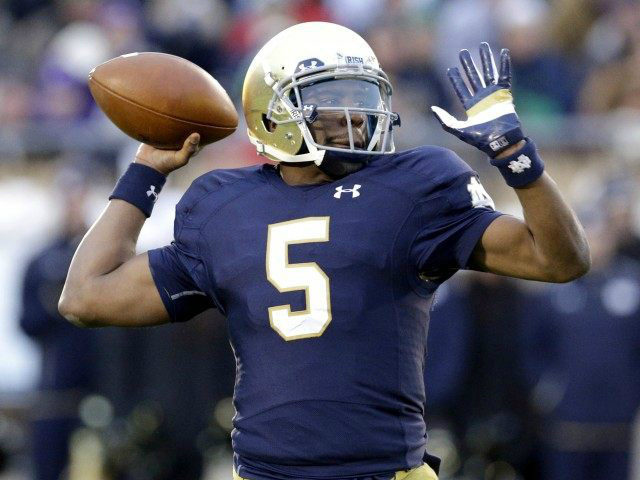In the wake of Texas firing Charlie Strong, a disciplinarian—as his surname suggests—who coached young men the right way but ended up on the wrong end on too many scoreboards, Bleacher Report asked more than 30 current former and current FBS coaches about whether coaches can succeed without cheating. “The overwhelming answer: Probably not. At least not right away.”
The article by Matt Hayes reads as a fascinating and excellent piece of sports journalism. But the otherwise thorough report misses the context. It’s journalism and not history, so one understands the omission. But readers often misunderstand without context that rebuts notions that a good-old days existed when collegiate gridirons remained innocent of foul play pursued for a competitive advantage.
The cheating scandal at Notre Dame works as a case in point. The NCAA forced Brian Kelly’s squad to vacate 21 wins during 2012—a season that saw the Fighting Irish compete in the national title game—and 2013 over a trainer performing course work for two students and six other players receiving improper academic benefits. Rather than demonstrate a dirty game, the stiff sanction shows how clean college football operates relative to yesteryear.
Why do we think otherwise? I blame Ronald Reagan.
“There will never be but one Knute Rockne, here at Notre Dame or anywhere else,” Reagan’s George Gipp declares in the film Knute Rockne, All American. “He gives us something they can’t teach in schools, something clean and strong inside—not just courage but a right way of living, that none of us will ever forget.”
The real Knute Rockne bet on the Fighting Irish as a player and coach. He performed as a professional boxer and football player as he competed as an amateur at Notre Dame. He employed hometown referees to officiate Fighting Irish games in a less than impartial manner. And he fielded athletes who did not go to school at Notre Dame.
The player who later lent a nickname to the 40th president played as a case in point. Jack Cavanaugh’s biography The Gipper notes that George Gipp “had gone through two academic years without receiving any grades and had failed to take final examinations in any of his classes.” Playing professional sports, spending days as a shark in local pool halls, and even taking part in bootlegging on the side generally precludes such mundane pursuits as studying and attending class.
Nobody punished that Notre Dame. We glamorized it. The NCAA harshly and appropriately penalized this Notre Dame. We imagine them as getting off scot-free.
Lest one imagine this as a smear upon a great coach, which Knute Rockne certainly was, consider the era in which he coached. Pop Warner gambled on games. He shared gate receipts with student-athletes. He utilized a hunchback hidden-ball trick, substituted an assistant coach for an injured player, and even embroidered true-to-scale football emblems on sweaters to confuse opponents.
We name a youth football league after this man.
All this is not to say cheating didn’t matter to our football forebears. It did. In addressing “The Evils of Football” during the infamous 1905 season, Harvard President Charles Eliot downplayed physical dangers in favor of focusing on ethical ones, arguing that “the main objection lies against its moral quality.” He specifically cited trick plays, coaching from the sidelines, and scrums that hid shenanigans as aspects of the game harmful to the character of young men. Eliot, who regarded the curve ball as a form of dishonesty, sought to ban football at America’s oldest college.
Another Harvard man sought to save it. Theodore Roosevelt’s much-discussed football summit during that deadly 1905 season sought to improve sportsmanship as much as safety. The representatives from Harvard, Yale, and Princeton who attended the White House meeting released a joint statement in its wake pledging to “carry out in letter and in spirit the rules of the game.”
And indirectly out of that meeting, and directly out of that season, came the NCAA that so harshly punished Knute Rockne’s alma mater this week.
The game of college football plays cleaner now than it did then. We understand the present better when we look at the past as it was rather than as we wish.
Daniel J. Flynn is the author of The War on Football: Saving America’s Game (Regnery, 2013).

COMMENTS
Please let us know if you're having issues with commenting.